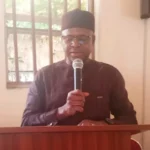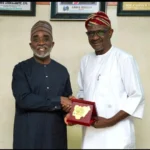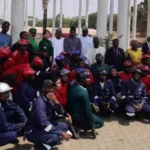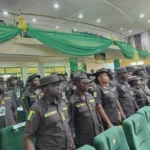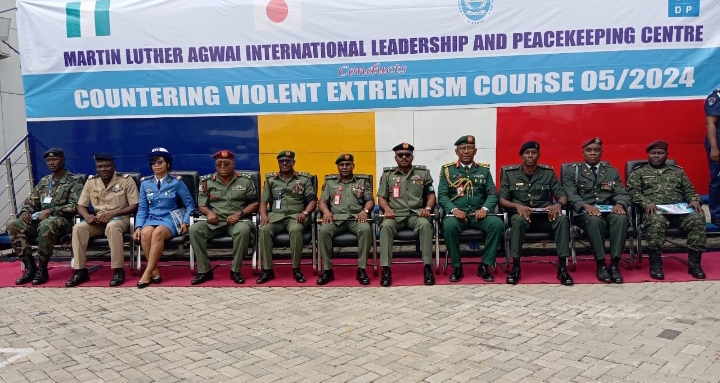The General Officer Commanding (GOC) 81 Division, Maj.-Gen. Farouk Mijinyawa, has stressed the need for partnership and collective efforts to eradicate violent extremism in the country.
Mijinyawa said this at the graduation ceremony of 32 participants of Martin Luther Agwai International Leadership and Peacekeeping Centre (MLAILPKC) on Countering Violent Extremism.
The News Agency of Nigeria (NAN) reports that the Countering Violent Extremism Course 5, 2024 which started on Oct. 26 ended on Nov.8 at the Nigerian Army School of Finance and Administration (NASFA) Lagos.
Participants from Ghana, Sierra Leone, Cameroon, Guinea Bissau, Togo and Liberia took part in the two-week rigorous training.
Mijinyawa commended the seamless collaboration between MLAILPKC and the Government of Japan, through the United Nations Development Programme (UNDP), which resulted to the approval and conduct of the course.
According to him, the strategic partnership between the Centre and the Government of Japan through the UNDP serves as beacon of international cooperation which needs to be sustained.
He quoted former UN Secretary General, Kofi Annan, as saying that the greatest weapon against extremism is collective action.
“This points to the fact that it is only through partnership and collective efforts that we can eradicate the menace of violent extremism in the world,” he said.
The GOC said that violent extremism had continued to threaten world peace and humanity in general, adding that all stakeholders must unite to counter it by addressing the root causes.
“These include support to education, community engagements and creating economic opportunities.
“The training will help to enhance capacity and equip potential peacekeepers with the requisite expertise to handle threats posed by violent extremism.
“It will also enable them to effectively perform their roles in a multidimensional peacekeeping mission,” he said
He expressed satisfaction with the caliber of erudite resource persons, facilitators and experts that were invited from both within and outside the country to make presentations during the course.
“We appreciate you for the knowledge you have imparted and for sharing from your wealth of experiences.
“I urge the graduands to apply the knowledge gained from this course in the discharge of their responsibilities in their various formations, units and organisations,” he said.
Mijinyawa commended the collaboration of the Government of Japan, and the UNDP with MLAILPKC which continued to demonstrate their unwavering commitment to ensuring peace and stability in Africa and the world at large.
Mr Matthew Alao, Team Lead, Governance, Peace, and Security Unit, UNDP Nigeria, said that violent extremism was a complex, multifaceted problem that required equally nuanced and adaptable solutions.
“You will face challenges, setbacks and moments of doubt. However, be hopeful; be optimistic because our struggle is not the struggle of a day or a year, it is the struggle of a lifetime,” he said.
Alao expressed confidence in the knowledge and skills the participants had acquired, saying that they were not just academic achievements, but the building blocks of resilient communities and sustainable peace.
“Your training equips you to be the architects of this justice; to build bridges where others see only divides, and to illuminate paths towards reconciliation in the darkest corners of conflict.
“Now, you stand ready to return to your respective countries, organisations, and communities as agents of positive change,” the UNDP representative said.
He urged the participants to always remember that countering violent extremism was not solely about security measures or law enforcement.
“It is about addressing root causes, fostering inclusive societies, and offering hope where despair once reigned.
“Your role extends beyond tactical responses; you are now architects of resilient communities and advocates for social justice,” he said.
Alao appreciated the Government of Japan, MLAILPKC, the Ministry of Budget and National Planning, and the UNDP for their support which had been instrumental in shaping future leaders.
One of the participants of the training, Lt.-Col. Thomas Nimele, from the Armed Forces of Liberia, said that the course broadened his knowledge regarding peacekeeping in violent extreme situations.
“The training also gave me insight into the drivers that cause violent extremism and how to use non kinetic measures to win the war.
“Countering violent extremism is a holistic approach involving both government institutions and societal institutions, using non kinetic approach to defeat the ideology of violent extremism,” Nimele said.
Also, Maj. Felix Adongo, from the Ghana Army, said that his take home would be to employ the use of more non kinetic measures in countering the extremist agenda rather than always resulting to force.
“It is important that we tackle this menace from this angle by identifying and getting to the root causes of the extremists ideas and agenda,” Adongo said.(NAN)
Edited by Isaac Aregbesola/Kadiri Abdulrahman



